Estimated reading time: 5 minutes, 17 seconds
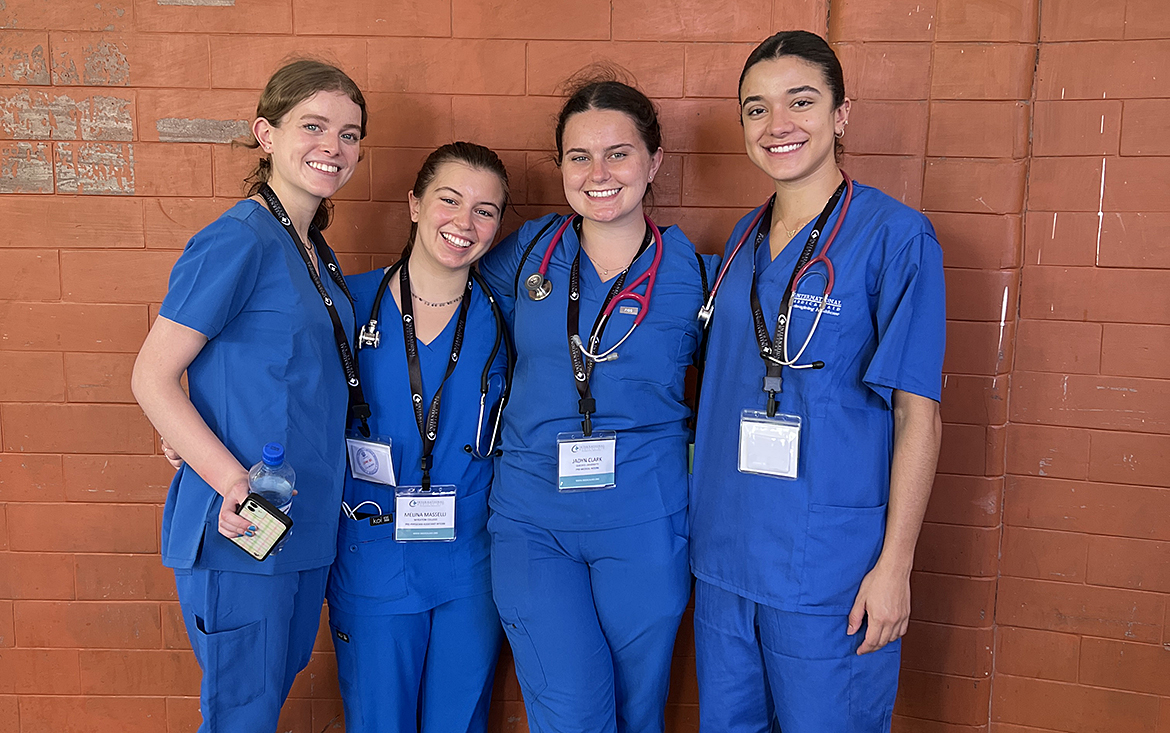
Melina Masselli (second from left) and some of her fellow International Medical Aid interns pause for a photo after their first day of rotations at Coast General Teaching and Referral Hospital in Mombasa.
It’s hard to say who among the more than 3,400 Mitchell Scholars and alumni has traveled the farthest on a Mitchell Institute fellowship since the supplemental financial support was first offered in 2001.
By clocking nearly 7,400 miles this summer, Melina Masselli is a likely contender.
Masselli, a 2020 Mitchell Scholar from Lewiston High School and rising senior Pre-Med–Biology major at Wheaton College in Massachusetts, applied for fellowship funding and was named a Dubyak Fellow. The $1,500 she received through a gift to the Mitchell Institute from Michael and Denise Dubyak helped defray the cost of her flights to and from Kenya for a nearly six-week pre-physician assistant internship with International Medical Aid.
Based at Coast General Teaching and Referral Hospital in Mombasa, Masselli and her fellow interns observed physicians and PAs in obstetrics and gynecology, pediatrics, radiology, and general surgery for up to six hours a day starting in late May. Interns also participated in community outreach, including assisting with mobile medical clinics, teaching hygiene and basic anatomy in local schools, and conducting food drives to help provide people with staples and necessities.
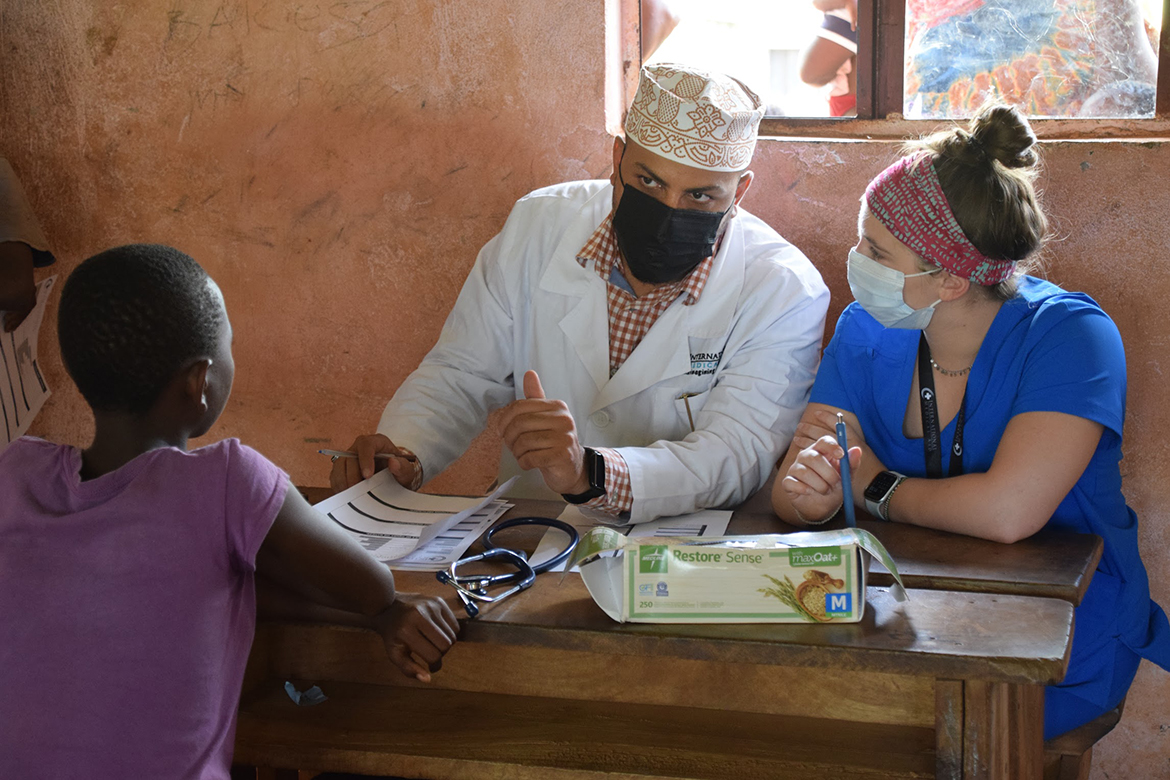
Masselli (above right) was paired with a physician during a community medical clinic held at the Mwarakaya Primary School in the Chonyi area of Kilifi County, Kenya, where interns and staff provided healthcare services free of charge to more than 300 members of the community. “The physician I was paired with was able to translate Swahili and explain each patient complaint, diagnosis, and plan of care,” Masselli said.
Upon returning home in early July, Masselli said a highlight of the field experience was “standing shoulder to shoulder” with volunteer Western surgeons while they performed two pediatric open-heart procedures.
“One involved a 14-year-old girl, who had a congenital heart defect that’s usually resolved within the first nine months,” Masselli said.
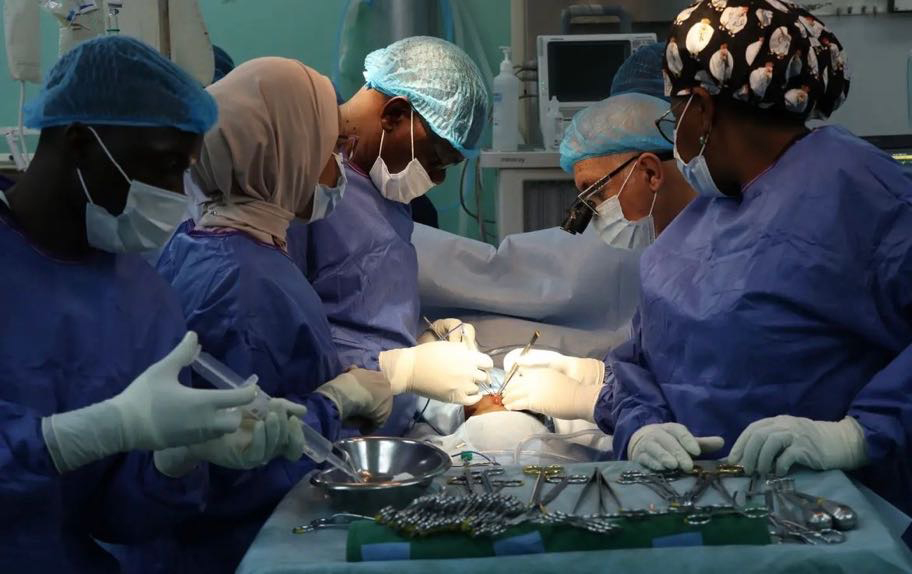
The nonprofit organization Care for a Child’s Heart completed 25 pediatric open-heart procedures at Coast General Teaching and Referral Hospital in Mombassa, and Masselli was able to observe two during her internship. This was her view of the surgical team at work. (Photo courtesy Coast General Teaching and Referral Hospital Instagram account.)
While she found the resourcefulness of local healthcare providers who face critical shortages of supplies and viable equipment to be inspiring, “It was hard to witness how little health care some people have” for the widespread prevalence of HIV, malaria, a host of congenital anomalies, and high rates of sickle cell anemia and tuberculosis due to malaria.
“It’s a heartbreak and a half,” she said. “It’s one-hundred and eighty degrees from the healthcare we have here in the U.S. I sent a text to my mom during the program and told her not to let me complain about anything ever again.”
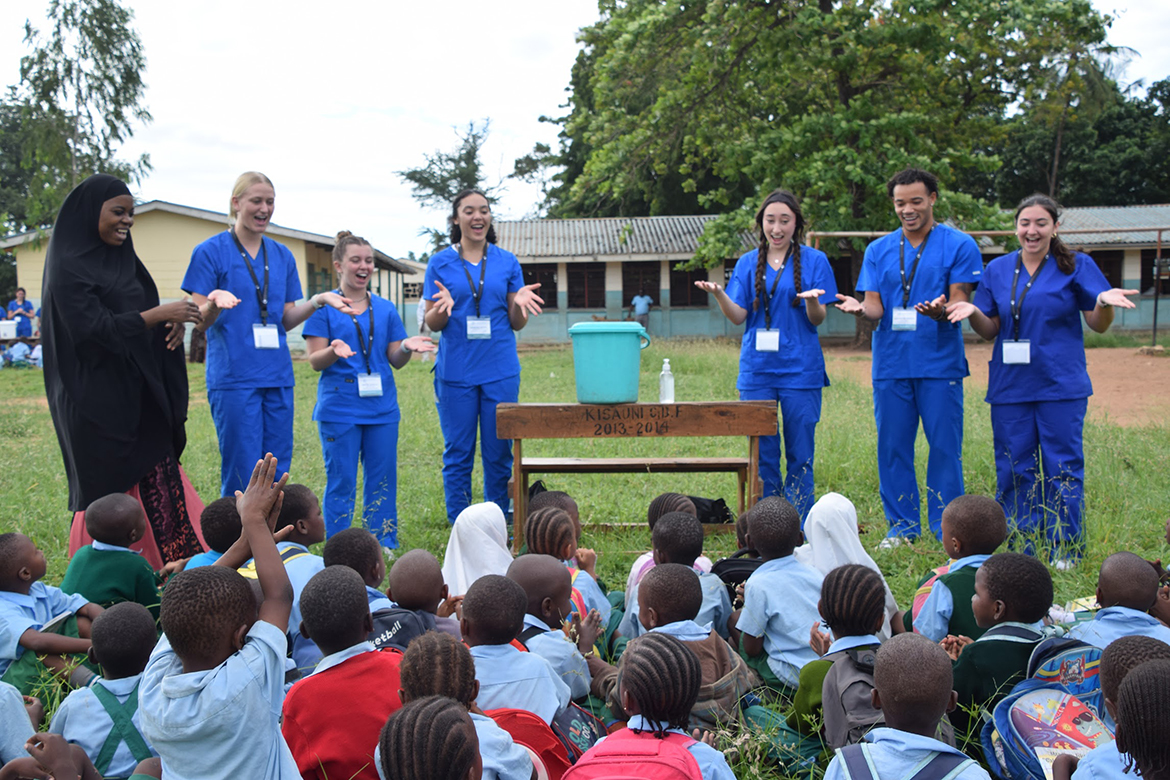
Masselli, third from left, and her fellow interns demonstrate handwashing hygiene with song at the at the Shimo La Tewa Primary School.
The internship also changed Masselli’s perspective on what kind of medicine she hopes to practice. Based on her prior forays into healthcare, which included working as a physical therapy rehabilitation aide with a PT practice in Auburn, Maine, and her own experience as a competitive swimmer in high school and at Wheaton, Masselli originally envisioned a career in orthopedics, specializing in the outpatient treatment of adolescents and adults with sports-related injuries.
“I didn’t expect to like it, but I’m now drawn to surgery, especially cardio-thoracic procedures,” she said. “And I’m drawn to treating children, either in the neonatal intensive care unit or pediatrics.”
Asked about the reasons for the change in interests, Masselli cited the teen patient whose heart surgery she observed and her rotation in the hospital’s newborn unit (NBU), where she spent most of her time with high-dependency patients, alongside Dr. Noel, “an incredible medical officer intern.”
Within the NBU, Masselli witnessed Dr. Noel’s team treat a newborn struggling with necrotizing enterocolitis, a condition that begins with inflammation of the intestine, causing bacterial invasion that leads to cellular damage and necrosis of the colon and intestine. The condition almost exclusively strikes neonates and has a 50% mortality rate.
“I remember the silence of the monitor attached to one of the newborns who had been fighting a battle with (the illness) and the nurses who all surrounded the incubator in a panic,” Masselli recalls. “For close to 20 minutes, Dr. Noel and the rest of the staff performed compressions in an attempt to get a heartbeat that, unfortunately, never returned.”
After her experience in the NBU, Masselli says the reason she put pediatric surgery in her sights is that “children are so innocent. There’s nothing they can do for their own predicaments. Being able to take any step toward making a child feel better and supporting their family during the process was a rewarding experience.”
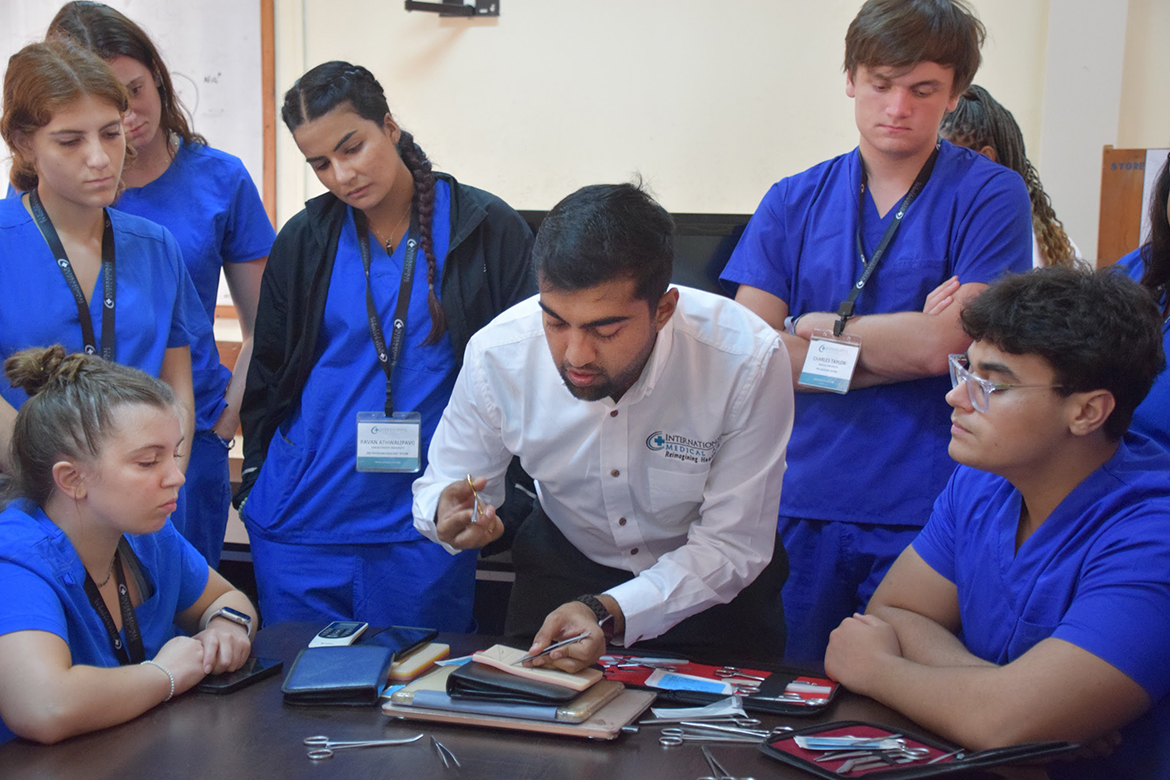
Masselli (lower left) and her fellow interns learned different suturing techniques during a clinical simulation led by Dr. Shazim (center) and were able to practice their skills on the simulation model following the demonstrations.
The internship in Mombasa also gave Masselli a deeper appreciation for one of the root challenges people face the world over: access to preventative healthcare. In Kenya, she says, the problem is linked to a shortage of professionals, as an average of 21 doctors and 100 nurses are available to support every 100,000 people — far short of the World Health Organization’s minimum recommendation of 36 and 356 (respectively) for every 100,000. And she found that affordable health insurance is another barrier to healthcare.
This moved beyond the realm of statistics during her rotation in the outpatient clinic for surgery, where Masselli met a patient who came in with severe lymphedema, a swelling of the tissues caused by an accumulation of fluid that is normally drained through the body’s lymphatic system.
Untreated, the swelling in his upper extremities had reached the point where “he was unable to keep his arms at his side or turn his neck when somebody was speaking to him,” she said.
When advised to have an MRI performed, the patient refused, citing an inability to pay for the diagnostic procedure.
“Without any further inquiry or conversation, the doctor I was sitting with at the time looked him in the eyes with a somber expression and told him, ‘Find those in your life who are important to you and tell them what is needed. You have less than six months to live,’” she said.
As heartbreaking as some of the patient interactions were, Masselli says their value lies in how they will inform her studies during a physician assistant graduate program and her future treatment of patients.
“Throughout my time in Kenya, I broadened my perspectives and became more aware of the unspoken realities of healthcare,” she said. “I will use the experiences to be a more sensible practitioner and initiate change for my patients, and I will always emphasize the patient over the problem and ensure their experience is comfortable.”
She also learned that despite a language barrier, “smiles are universal.”
“I continue to be in awe of the strength, compassion, and kindness of the Kenyan community,” she said. “I can wholeheartedly say that the experience changed me for the better, and I will continue to cherish and carry the memories made there for the rest of my life. None of this would have been possible without a fellowship from the Mitchell Institute, and I’m so grateful for the investment in my goal of becoming a physician assistant.”
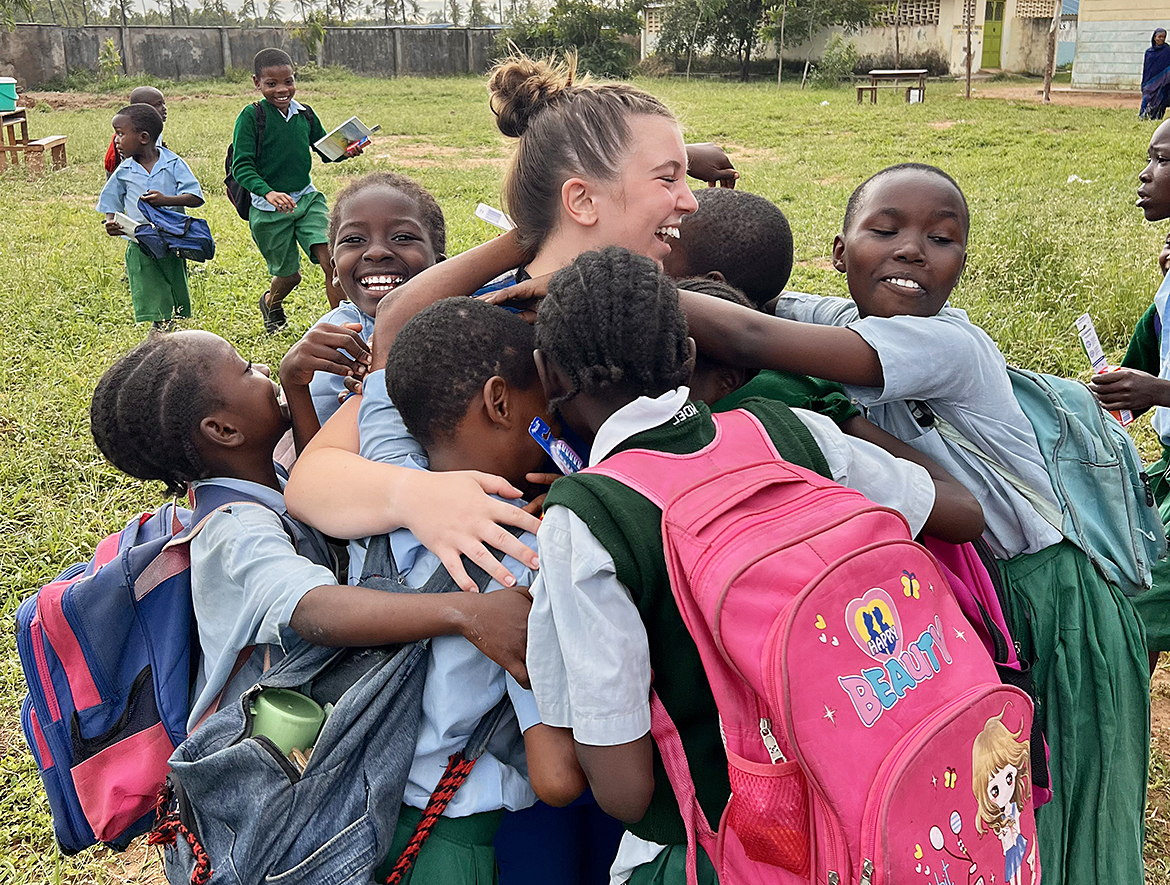
At a hygiene education session held at the Shimo La Tewa Primary School in the Shanzu neighborhood of Mombasa, Masselli and her fellow interns organized interactive activities to teach teeth-brushing practices and hand hygiene. “This group of girls were all so excited to dance and play games with us after the session and wanted to share some hugs,” Masselli said.
